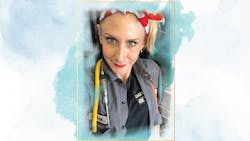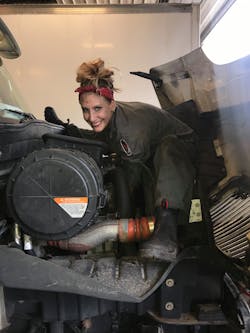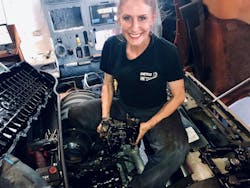Technician crushes common shop stereotypes
As a kid, Melissa “Missy” Albin was constantly getting into trouble for breaking things just to put them back together. Albin was adopted by a family who couldn’t have children, and their idea of success for her was graduating from a four-year college and attaining a “white-collar” job. She had other ideas.
After giving two semesters at a four-year university a try, Albin dropped out to chase her passion: solve problems, tinker with things, and explore her more adventurous side. That led her to getting her start as a diesel technician in 2004.
At the time, Albin’s father was a truck driver who owned a small trucking company in Massachusetts. He ended up giving her a job doing his books and small repairs around the shop. Her father’s company eventually downsized, and at age 18 Albin ended up meeting her biological mother, whose husband also worked in trucking. Albin’s stepfather needed help at his company and gave Albin an opportunity to clean the trucks coming back to home base at the end of the day and become familiar with his books and maintenance operations.
See also: Finding and retaining technicians: Understanding the supply and demand
In 2009, Albin ended up finding a job as a technician at a Dattco IC Bus dealership in Connecticut. Today, she is a master-certified technician for both International Trucks and IC Bus with Navistar. Albin is currently working toward her Automotive Service Excellence certification and has been a representative for female technician recruits since 2020. She is also part of International Trucks’ Women in Network program, a support and advocacy group of female employees across all ranks at International.
“Female technicians are just 2% in International, and it’s difficult for people to overcome stereotypes,” Albin said. “I am trying to advocate for and represent female technicians and the next generation to come.”
One of the stereotypes Albin is alluding to is what people think a technician should look like.
“When people see me and I say what I do as a job, they say ‘no way,’” she said. “I am only 120 lb. and when people hear what my profession is, they think that I should be a larger man, strong, and look dirty and that my nails should be dirty.”
“I get my nails done,” Albin added with a laugh.
Another stereotype that Albin had to overcome was the misconception that she couldn’t do the job when she became pregnant. Fun fact: Albin repaired heavy trucks through 39 weeks of her pregnancy.
“I had the ability to safely work while I was pregnant, and I actually did more work and earned more respect while I was pregnant than I ever had,” she said. “The guys were very supportive, especially when they saw me throwing up off to the side of the engine.”
“I got to where I am today by taking charge and being in control of the ability to communicate and have an open dialogue about what I could do when I was pregnant,” Albin stressed. “It’s really important that someone doesn’t tell you what you can and can’t do. As females, that’s what we are told our entire lives.”
See also: The benefits of on-site maintenance
In her line of work, Albin added, muscles aren’t everything.
“It’s not about how strong you are; it’s your ability to look at problems and use your tools correctly to get the job done,” she advised.
Having supportive mentors are also important for female success in the shop, Albin said. She’s lucky enough to have two.
Ron King is one of her mentors from the Dattco IC Bus dealership in Connecticut, where she worked from 2009-2015. Joe Dougherty is her current mentor and boss who Albin credits for helping her blossom into the technician she is today.
“Mentors are there to push you into your best success,” Albin said. “They make you confident in your abilities that you may not have had confidence in before.”
When it comes to attracting more women into today’s maintenance and repair shops, Albin said it’s all about public relations and marketing.
“There are so many companies out there that haven’t really embraced diversity and the need for the industry to revolutionize in this era,” she pointed out. “I would love to see big-name companies in the automotive and diesel sector have more equality in marketing.”
As for some additional challenges Albin has faced throughout her career, harassment in all its forms has been all-too real for her. However, she never let that deter an open and ongoing dialogue about harassment with her employer.
“When you are coming into a man’s world, it’s important for women to know about healthy boundaries,” she advised. “My goal is to help women with that.”
For Albin, this is the best time for anyone looking to become a truck technician. She’s enthusiastic and excited for trucking’s electric and technologically advanced future.
Albin is also hitting the road soon for Navistar’s hands-on electric vehicle maintenance training.
“I feel connected to the EV era coming up, and I am so excited to begin this,” Albin said. “I feel like I entered this industry at the best time, and I think anybody coming in is going to be super successful.”
One piece of advice from Albin for other women looking to become technicians: Don’t forget about self-care.
“I don’t think that we talk about wearing appropriate clothing and PPE,” she said. “As a technician, we have to wash the chemicals from our skin. It’s important to talk about skincare safety and moisturizing and wearing gloves. It’s something I am very passionate about telling women in this industry.”
This article originally appeared in FleetOwner.com.
About the Author

Cristina Commendatore
Cristina Commendatore is the Executive Editor of FleetOwner magazine. She has reported on the transportation industry since 2015, covering topics such as business operational challenges, driver and technician shortages, truck safety, and new vehicle technologies. She holds a master’s degree in journalism from Quinnipiac University in Hamden, Connecticut.


